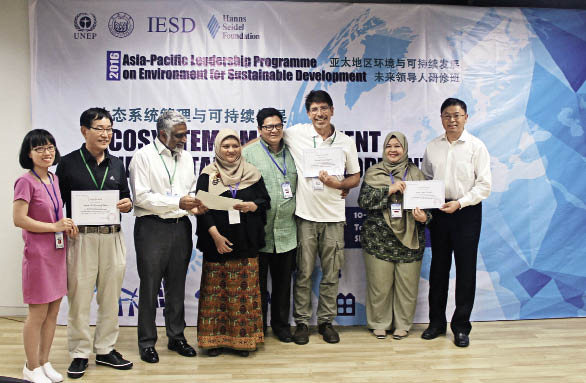International Cooperation on Education for Sustainable Development
China Today by LIU YI, December 20, 2016 Adjust font size:
Transforming the Existing Educational System
Tongji University, founded in 1907, has a long-established reputation for its urban planning and construction disciplines. As environmental deterioration appeared earlier in cities than in the countryside, it is natural that the university should focus on such issues. In 1988, Tongji established the College of Environmental Engineering, the first of its kind in China. As of today, Tongji’s built environment is around 20th in the QS World University Rankings by Subjects.

Tongji University plays an integral role in sharing and promoting sustainability knowledge.
Tongji promoted on campus green architecture, water recycling and reuse, and garbage sorting. It also established the campus energy management system that has been adopted in more than 120 of China’s universities. But more importantly, Tongji has spared no efforts to promote the sustainable development concept in all its courses. The content of each is reviewed through the lens of sustainable development. Any facet of knowledge that goes against the concept is immediately checked and rectified.
“In the past, all students of engineering technology regarded cost-efficiency as paramount. Effectiveness and functionality were therefore the prime benchmarks in the construction of a building,” Professor Wu Jiang said. “But pollution and resource problems have forced us to take the environmental dimension into consideration. That entails thoroughgoing changes to courses, from program and curriculum design to lecture content.”
New energy vehicles are a prime example of Tongji’s transformation of its traditional curricula. In 2002, at the initiation of then Vice President of Tongji University Wan Gang, now China’s Minister of Science and Technology, it established the New Energy Vehicles Engineering Center. “Tongji now ranks first in China in automobile studies,” Wu Jiang said. “But the thinking and practice from the perspective of sustainable development has been consistent.”
Wu Jiang went on to say that Tongji’s research on applying new energy technologies to public transportation and rail transportation began early. Their findings showed that although sedans can run on new energy, they nevertheless occupy disproportionate amounts of road and space resources. In 2010, therefore, the university produced new energy buses that were used at the Shanghai Expo. But public transportation might not always meet personalized demands, so why not create a smart renting system that enables people to use new energy cars in a time-sharing way? Wu Jiang is pondering this possibility.
Amid this ethos, Tongji students are dedicated to research and innovations of sustainable development. The Green Seed, for example, is a club that a dozen or so students set up in 2012. It encourages students at Tongji and other universities across the country to put knowledge gained from lectures to use on investigations of environmental issues.
In the past several years, Green Seed participants have undertaken a wide range of research projects – from processing discarded cellphones, to the illicit online wildlife trade, to agricultural water usage in the Dunhuang region, to the developmental status quo of non-governmental environmental organizations in China. They carried out many field surveys and even raised detailed solutions to these issues.
